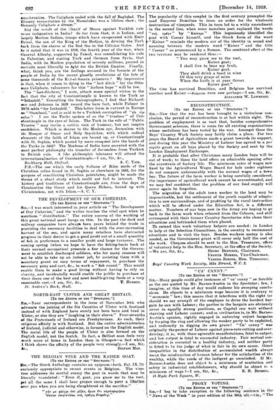"CA' CANNY."
[To THE EDITOR Or T'HE " SPECTATOR.")
Stn,—Many people could give instances of "Ca' canny" as forcible as the one quoted by Mr. Barnes-Austin in the Spectator; few, I imagine, at this time of day would endorse his sweeping conclu- sions. He objects to a minimum wage because it is contrary to "economic" law; this means that it interferes with the right (or should we say wrong?) of the employer to drive the hardest bar- gain he can with Labour; the parties to the bargain are obviously never in equally strong positions, as Capital can wait without starving and Labour cannot; and so civilization is, in Mr. Barnes- Austin's opinion, rightly engaged in enforcing unjust bargains by he ping the ring and allowing the weaker party to be exploited, ant indirectly in digging its own grave! "Ca' canny" was originally the protest of Labour against piece-rate cutting and over- driving; it is, with those agreeable manifestations, fatal to output, ant low output is fatal to successful industry. Fair mutual con- sideration is essential to a healthy industry, and neither party is fitted to be the judge of what is fair in its own cause. Great inequalities in the distribution of accumulated wealth always mean the misdirection of human labour for the satisfaction of the wealthy, while the reeds of the indigent go unsatisfied. If Mr. Barnes-Austin does not object to a minimum of sanitation and safety in industrial establishments, why should he object to a
minimum of wage P—I am, Sir, &c., E. H. Barnett. 18 Hyde Park Square, W.






































 Previous page
Previous page